英译汉第九讲概要
- 格式:ppt
- 大小:456.00 KB
- 文档页数:23

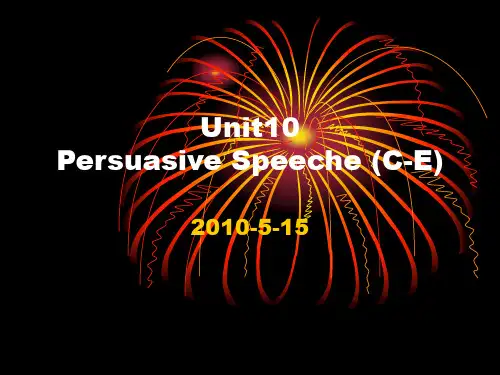
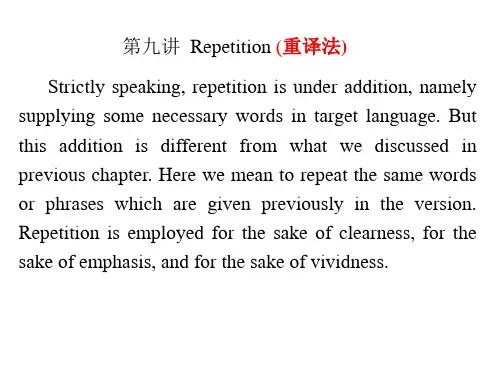
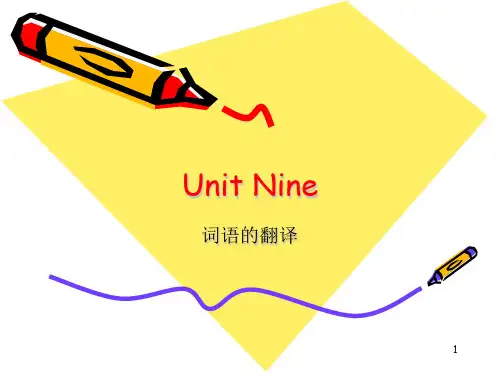
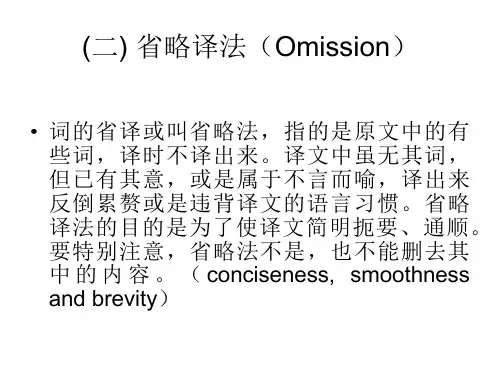
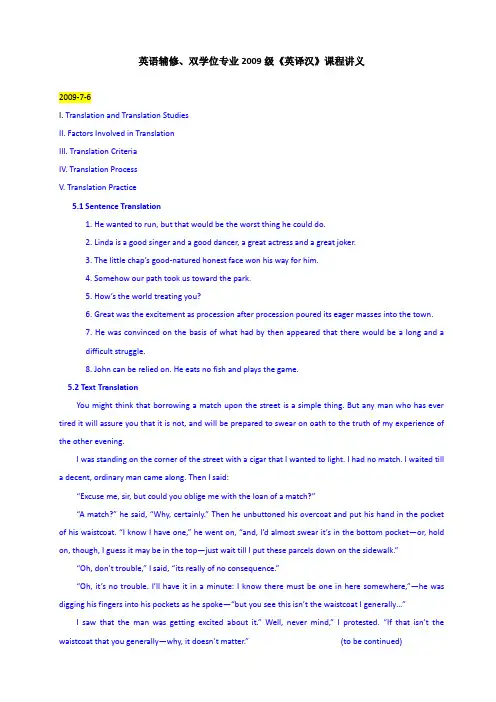
英语辅修、双学位专业2009级《英译汉》课程讲义2009-7-6I. Translation and Translation StudiesII. Factors Involved in TranslationIII. Translation CriteriaIV. T ranslation ProcessV. Translation Practice5.1 Sentence Translation1. He wanted to run, but that would be the worst thing he could do.2. Linda is a good singer and a good dancer, a great actress and a great joker.3. The little chap’s good-natured honest face won his way for him.4. Somehow our path took us toward the park.5. How’s the world treating you?6. Great was the excitement as procession after procession poured its eager masses into the town.7. He was convinced on the basis of what had by then appeared that there would be a long and adifficult struggle.8. John can be relied on. He eats no fish and plays the game.5.2 Text TranslationYou might think that borrowing a match upon the street is a simple thing. But any man who has ever tired it will assure you that it is not, and will be prepared to swear on oath to the truth of my experience of the other evening.I was standing on the corner of the street with a cigar that I wanted to light. I had no match. I waited tilla decent, ordinary man came along. Then I said:“Excuse me, sir, but could you oblige me with the loan of a match?”“A match?” he said, “Why, certainly.” Then he unbuttoned his overcoat and put his hand in the pocket of his waistcoat. “I know I have one,” he went on, “and, I’d almost swear it’s in the bottom pocket—or, hold on, though, I guess it may be in the top—just wait till I put these parc els down on the sidewalk.”“Oh, don’t trouble,” I said, “its really of no consequence.”“Oh, it’s no trouble. I’ll have it in a minute: I know there must be one in here somewhere,”—he was digging his fingers into his pockets as he spoke—“but you see this isn’t the waistcoat I generally…”I saw that the man was getting excited about it.” Well, never mind,” I protested. “I f that isn’t the waistcoat that you generally—why, it doesn’t matter.”(to be continued)2009-7-6参考译文句子翻译:1. 他真想拔腿就跑,但对他来说,最糟糕的事莫过于此。
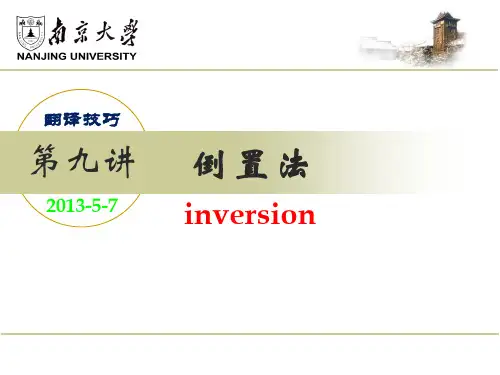

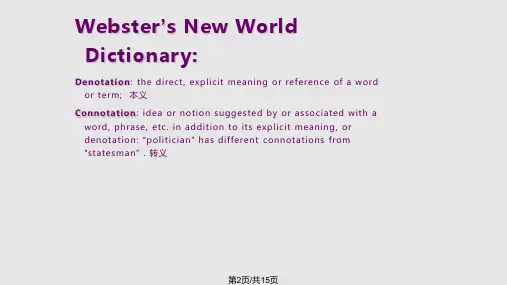
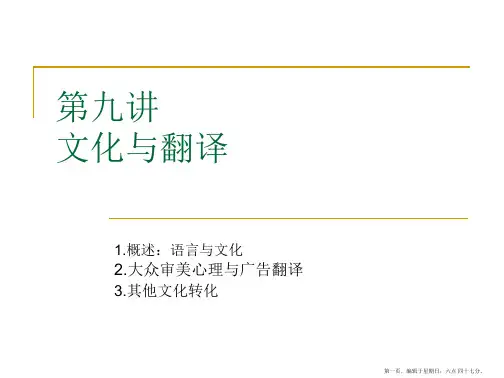

英语辅修、双学位专业2009级《英译汉》课程讲义2009-7-6I. Translation and Translation StudiesII. Factors Involved in TranslationIII. Translation CriteriaIV. T ranslation ProcessV. Translation Practice5.1 Sentence Translation1. He wanted to run, but that would be the worst thing he could do.2. Linda is a good singer and a good dancer, a great actress and a great joker.3. The little chap’s good-natured honest face won his way for him.4. Somehow our path took us toward the park.5. How’s the world treating you?6. Great was the excitement as procession after procession poured its eager masses into the town.7. He was convinced on the basis of what had by then appeared that there would be a long and adifficult struggle.8. John can be relied on. He eats no fish and plays the game.5.2 Text TranslationYou might think that borrowing a match upon the street is a simple thing. But any man who has ever tired it will assure you that it is not, and will be prepared to swear on oath to the truth of my experience of the other evening.I was standing on the corner of the street with a cigar that I wanted to light. I had no match. I waited tilla decent, ordinary man came along. Then I said:“Excuse me, sir, but could you oblige me with the loan of a match?”“A match?” he said, “Why, certainly.” Then he unbuttoned his overcoat and put his hand in the pocket of his waistcoat. “I know I have one,” he went on, “and, I’d almost swear it’s in the bottom pocket—or, hold on, though, I guess it may be in the top—just wait till I put these parc els down on the sidewalk.”“Oh, don’t trouble,” I said, “its really of no consequence.”“Oh, it’s no trouble. I’ll have it in a minute: I know there must be one in here somewhere,”—he was digging his fingers into his pockets as he spoke—“but you see this isn’t the waistcoat I generally…”I saw that the man was getting excited about it.” Well, never mind,” I protested. “I f that isn’t the waistcoat that you generally—why, it doesn’t matter.”(to be continued)2009-7-6参考译文句子翻译:1. 他真想拔腿就跑,但对他来说,最糟糕的事莫过于此。
自考公共英语(一)课文翻译(unit9)Unit 9Text A学者词汇和大众词汇每一门经过锤炼的语言都有两大类词,它们一起构成了这门语言的整个词汇。
首先,有一类词是我们日常谈话熟悉的。
也就是说,它们是我们从家人,伴侣那里学来的词,即使我们是文盲也知道它们和会使用它们。
这类词涉及生活的一般事物,是所有说这种语言的人的常备词汇。
这样的词可以叫做“大众词汇”,因为它们属于普通大众,而并非人数有限的某个阶层所专有。
另一方面,我们的语言包罗了大量在日常扳谈中相对很少使用的词。
每个受过教育的人都知道这些词的意义,但在家里几乎没有机会使用这些词。
我们最先了解它们不是从母亲的口中或从同学的谈话中,而是通过我们所读的书,所听的演讲,或者通过受过高深教育的讲话者用庄重文体谈论某个话题时的正式谈话。
这些词被叫做学者词汇。
了解学者词汇与大众词汇之间的不同对正确理解语言非常重要。
这两类词的不同通过几个例子就能够很容易地看出来。
我们可以用“lively”或“vivacious”形容一个女孩。
前一种情况,我们用了一个由常见名词“life”构成的英语本族语词。
后一种情况,我们用了一个从拉丁语派生的词,词义同样准确。
但这两个词使用的环境大不一样。
从来没有人是由书上学到“lively” 这个形容词的,这个词是大众词汇的一部分。
我们不记得什么时候我们知道这个词,但我们必定在学会读书前很久就已经认识它了。
另一方面,我们可能已经过了好几年才学到“vivacious”这个词。
我们甚至可能还记得,第一次在书报上读到它或从一些成年伴侣那儿听到它时的情景。
“lively”和“vivacious”都是很好的英语词,但是“lively”属于大众词汇而“vivacious”属于学者词汇。
当运用词汇时,“大众的”和“学者的”这两个术语的定义不是绝对的。
没有两个人的词汇是完全一样的,同一个词在一个人的词汇里可能是“大众的”,而在另一个人的词汇里则是“学者的”。